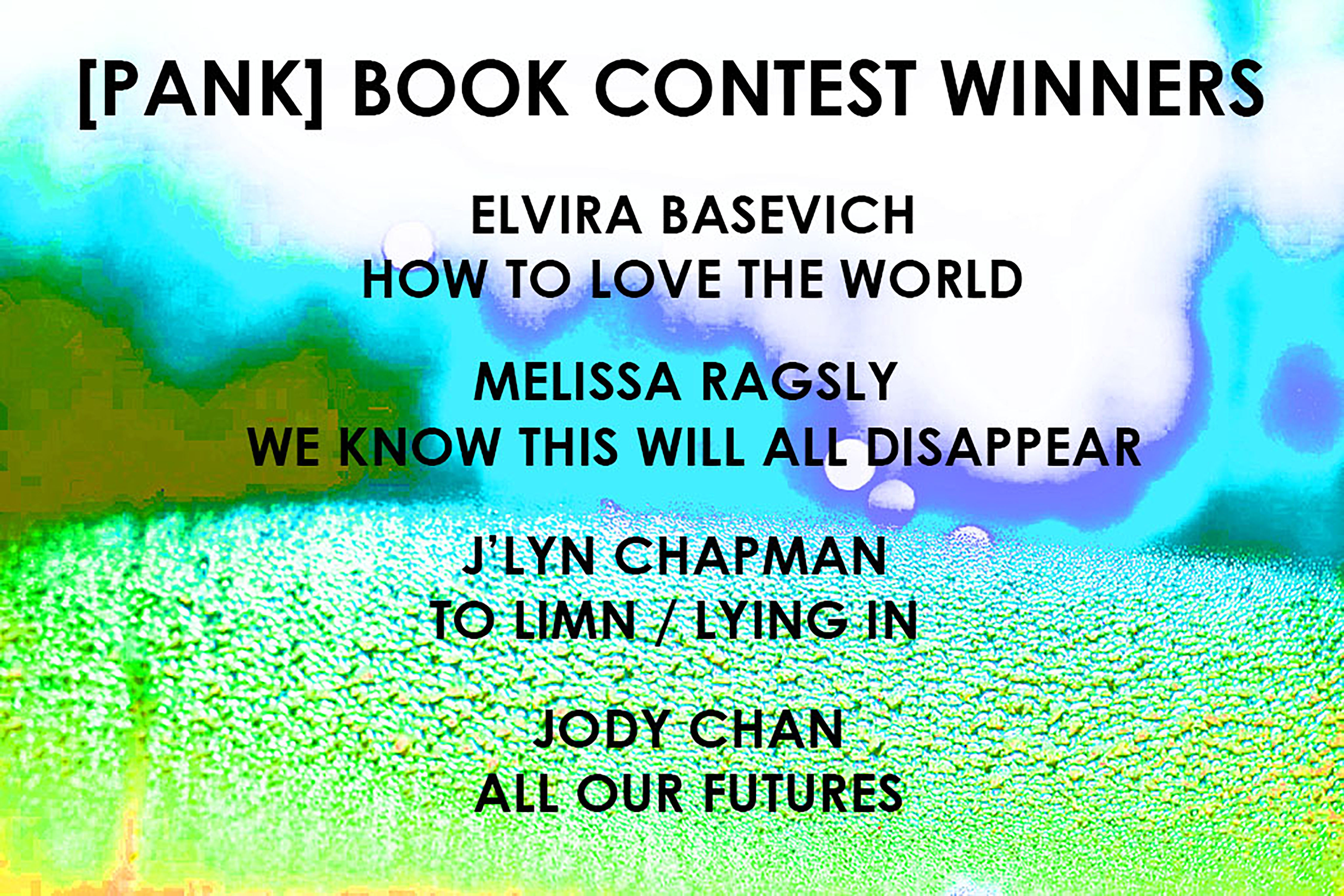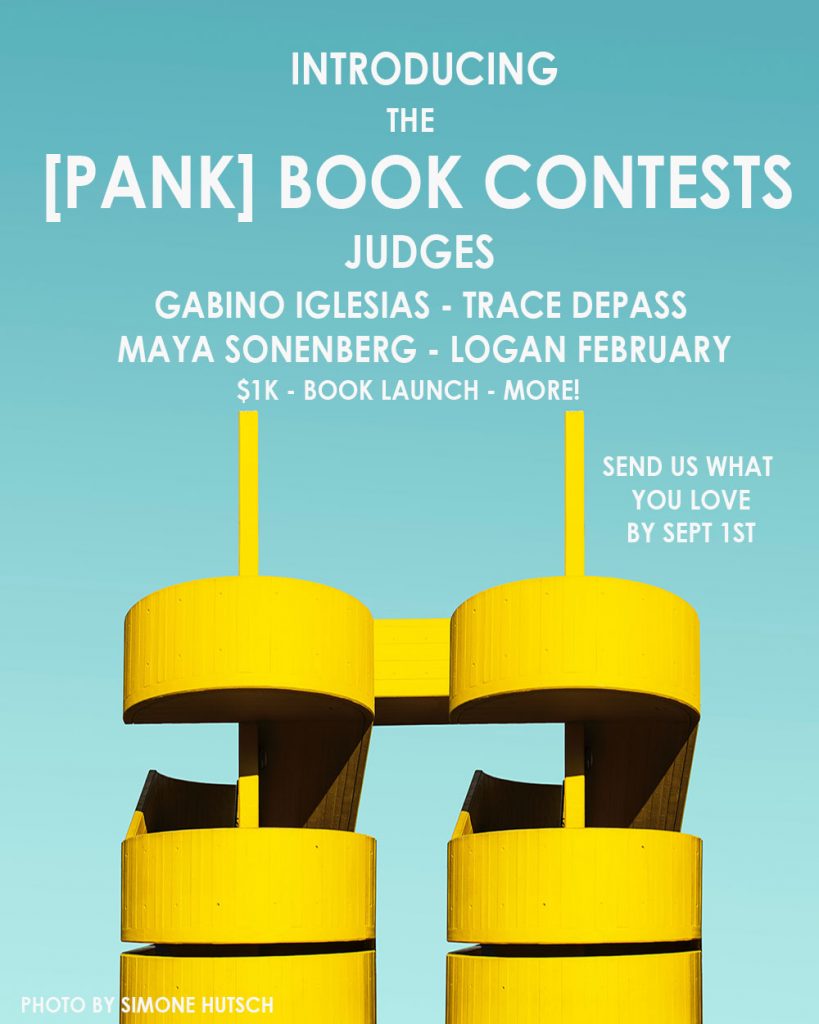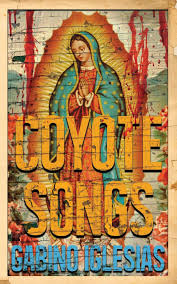Happy New Year and a huge congratulations to the winners of the [PANK] Book Contest — coming to you in Spring 2020!
Happy New Year and a huge congratulations to the winners of the [PANK] Book Contest — coming to you in Spring 2020!

Editorial Assistant and in-house interviewer Erinn Batykefer sat down with Mannequin in the Nude Author and Little Book Contest Judge Logan February to discuss what makes a stand-out contest submission!
Erinn Batykefer: Logan, it’s a pleasure to be back here in the interview chair with you again! The last time we chatted, you were considering baby blue hair for summer. Did that experiment come to fruition?
Logan February: It’s wonderful to be talking with you again! The last time was, what, four months ago? Amazing. So much has happened since then. But the blue hair, not yet. I’ve been very busy this summer (with a lot of internal work) so I haven’t felt much need to modify my appearance. But it will probably happen at some point, still.
EB: You’re Associate Director of Dovesong Labs, which mashes up the literary and the digital in creative video experiments, lessons, a salon, etc. Does the work to curate that space come to bear on your approach to judging PANK’s Little Book Contest?
LF: You know, there’s always so much to learn from being a reader and an editor, but I didn’t realize how much of a learning experience it would be to work as an educator, as well. Curating syllabi, creating study guides; it has evolved my relationship with poetics, and literary craft in general, in a big way. Language lets us into newer, fuller understandings (and misunderstandings) of self and society. I am interested in that—in the intention and execution of language.
EB: How do you see the little book / chapbook form working differently from a full length collection?
LF: I love chapbooks because you can read them in one go, you know, there’s limited space for the work to establish its thesis and formulate its own universe. I like the idea of that concision, I think a lot of amazing things can be born within that threshold. Where I see the full-length as a musical album—where you have to spend a whole cycle creating a complete body of work—my idea of the little book or chapbook is like an EP or a mixtape. I think of them as an opportunity to try out new poetics, to experiment, to tease new work, and just generally have a little more fun.
EB: What do you hope to see in the submissions for PANK’s Little Book Contest?
LF: Well, my love for literature transcends genre, so I am hoping to see a wide range of styles and inventions. I particularly like prose poetry and fragmented essays of creative nonfiction, so I hope I get stuff like that. Or like, a chapbook-length single poem! That would be very cool, I think. Everything, really, as long as it’s excellent. One of my current favorite pamphlet-type bodies of work is Anne Carson’s The Albertine Workout—in which she examines Albertine, the principal love interest of Marcel in Proust’s À la recherche du temps perdu—so I would be thrilled to read something like that, something critical and literary. Above all, I want to be amazed.
EB: You’re a student of forms, so you know the challenge and the skill it takes to write something that feels relevant in a form that is, in some cases, hundreds of years old—is that something that catches your eye when you’re reading new work?
LF: Ah, yes, definitely. Being written in a specific form makes a poem demand, I think, to be read a little closer, with a little more attention. It becomes important, then, to reward that attention with a well crafted poem, whose formal intentions are well realized. That’s what makes such poems worth all the effort they require.
EB: Your title from PANK this year, Mannequin in the Nude, draws on your global life as a queer African poet in its interrogations of religion, death, desire, grief, identity—one that is often dangerous to live. What, if anything, would you say to a writer who is facing similar risk in their work and life?
LF: I know firsthand how tough and terrifying it can be in that place, facing risk and threat externally, and many demons internally. All I can say is: have courage. Everything that must change requires your courage. Never forget to take care of yourself, and to stay as safe as possible. Do whatever you need to feel free. And you are allowed to get tired, to lose faith, to be afraid—fear is natural but it must not paralyze us. The important thing is to keep going.
EB: We can’t wait to see what you find among the finalists! Any last advice to the writers who are submitting work to PANK now or in the future?
LF: I can’t wait to get into it! All I can say is probably: have some trust in the writing, put in the work that it demands. And try to make wise decisions!

Editorial Assistant Erinn Batykefer sat down with [PANK]’s very own Reviews Editor and Fiction Contest Judge Gabino Iglesias to discuss all things writing!
Gabino is the author of Coyote Songs, a novel in which ghosts and old gods guide the hands of those caught up in a violent struggle to save the soul of the American southwest. A man tasked with shuttling children over the border believes the Virgin Mary is guiding him towards final justice. A woman offers colonizer blood to the Mother of Chaos. A boy joins corpse destroyers to seek vengeance for the death of his father.These stories intertwine with those of a vengeful spirit and a hungry creature to paint a timely, compelling, pulpy portrait of revenge, family, and hope.
Erinn Batykefer: I found your novel, Coyote Songs at the library and it had one of those big HORROR stickers on the spine. Your fiction has been published in anthologies that specialize in horror and crime fiction as well. How do you see genre functioning under the broad umbrella of fiction?
Gabino Iglesias: I see it as non-functioning. The only thing genre does is give you a set of rules and expectations while simultaneously limiting your readership. I’m fine with my work being called horror or crime or bizarro or magical realism (reviewers and readers have called it all those and more), but I won’t stamp a genre on it. That’s why I made up barrio noir. It’s its own thing. I think writers should tell the story they want to tell using the elements and styles that appeal to them the most. And they should do it without thinking about genre too much. That can come later, and only if it’s needed.
EB: You’ve also read for contests like Best of the Net and judged genre awards like the Shirley Jackson Award and this year’s Splatterpunk Awards. What excites you most when you’re reading through the slush?
GI: The gems! There are always gems. Anyone who reads through slush at any magazine will agree. You read good and bad and decent and mediocre and that’s part of it. Then, from time to time, you read something that shakes you to the core, something that blows your mind and makes you wish you wrote it. I love finding those books and stories.
EB: What excites you about reading for [PANK]’s Big Book Contest this year?
GI: People generally don’t know me, but they know [PANK]. [PANK] is a household name. Folks know [PANK] publishes top-notch stuff. Will some writers send work that isn’t ready? Sure, there is always some of that going on, but I think writers will look at the Big Book Contest and they will work hard to send in their best. I get to see all that goodness before anyone else and than I get to give someone some great news. There is nothing about the process that doesn’t appeal to me. I love all of it.
EB: Your work– particularly Coyote Songs– uses elements of horror and suspense, magical realism, and even fantasy to pry open and make viscerally immediate narratives about the Frontera, including migration, border crossings, and colonization. Unless you’re living them, these are narratives that often get distanced and dehumanized on the news, but the experience of reading horror is the opposite: it’s spiked heart rate and
the anxious turning of pages, the satisfaction of vengeance and the squirm of terror. Do you think that immediacy is corrective?
GI: Yes, to a degree. I think horror, or almost anything else for that matter, work best in the presence of empathy. It doesn’t have to be frontera fiction. It ca be a narrative about a poor, uneducated single mother struggling to survive in this country. She can be white, brown, black, whatever. Her pain, if you have a heart, becomes your pain, her anguish and desperation affect you. If that happens, that piece of fiction is successful. It can be literary fiction or noir; it doesn’t matter because it works. What I try to do with the things my characters go through is to make it universal. Any parent in any country will do whatever they can to not have to bury their kids. If I make some folks realize that that is exactly what happens at our border from time to time maybe they’ll realize that distance doesn’t matter.
EB: What are you hoping to feel when you’re reading a winning submission for this contest? What, in your opinion, should a Big Book of fiction do?
GI: A Big Book of fiction needs to accomplish two things. First, the storytelling has to be there, and it has to be amazing. It has to make me feel things. If I smile or nod, a book has me, has my attention. It can make me cringe or laugh or clench my fists. Whatever works as long as I’m feeling something. The second thing it has to do is have style. [PANK] publishes amazing work. I want to read prose that can stand next to poetry in terms of beauty but that never falls into the trap of trying to be pretty at the sake of being meaningful. A Big Book of fiction should make me say, “Wow, this narrative is amazing! And the writing is superb!”
EB: You’ve translated work before, and your books have been published in other languages as well—what’s your take on the same story in different languages, with different nuances, connotations, and references at work? Are they the same story when all is said and done?
GI: I don’t think so. Translation is rewriting in a way. I’m fine with that. I recently wrote a piece for LitReactor about the importance of work in translation. It opens the world to you. As long as book retains its essence, translation works. I’ve read books in Spanish and English. That has made me appreciate the role of outstanding translators. Thankfully we have more or those working now than even, and they usually take the time to research, talk to authors, and offer a translated version that is almost identical to the original, but we all know that copies are never exactly the same. My first novel is about to come out in Turkey this June. I exchanged emails with the translator. We had to discuss what a ferret was…
EB: If you could encourage fiction writers to read one thing before sitting down to write their next piece– a book, a genre, a craft manual—what would you give them for homework?
GI: I wouldn’t assign them anything! Haha. Too many books come to mind: David Joy’s The Line That Held Us, Cristina Rivera Garza’s The Taiga Syndrome, Cynan Jones’ Cove, Laird Barron’s Black Mountain, Juliet Escoria’s Juliet The Maniac, Brooke Bolander’s The Only Harmless Great Thing, Brian Evenson’s Song for the Unraveling of the World…too many! They come to me because they inspired me, they made me want to write. What I would do is tell them to think about a book that matters to them, a book they enjoyed. The first one that comes to mind is the one they should go get, crack open, and start reading. Feel inspired again. Remember the power of storytelling. Remember why we do what we do. That is homework, now and forever.
EB: Anything else you’d like to share with [PANK]? [PANK] suspects you know where to go for breakfast after an all-nighter spent reading scary stories.
GI: I love [PANK]. Share? Two things: 1. if you read anything lately that you loved, talk to me about a review. I’m always looking for more reviews. Indie books strongly encouraged. Bonus points for reviews of indie books written by minorities. Take trans people. They need to be represented and celebrated now more than ever. Give me all your trans poetry! 2. Come to Austin. I’ll make you some of the best breakfast tacos you ever had. We can read more scary stories while we eat.